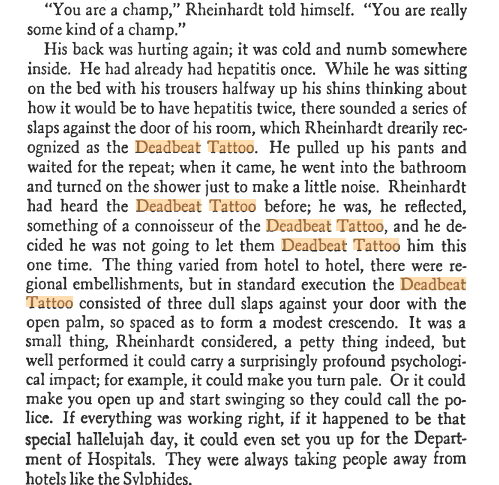Rose Rose
Rose is one of my favorite characters in W2W. At one point, she stands up. I might have said she took to her feet, but instead I wrote “Rose rose.”
The sentence is one of my favorites. In fact, I have frequently joked with noted humorist and Sherman Alexie defender Zane Sparling that I wrote the 193 pages preceding that sentence and the 199 that follow simply to make a place for “Rose rose.” That the whole 20 years I spent on W2W was about building a home for that sentence. And while that’s not quite true, the sentence does have roots that go back to the beginning of my writing life.
The inspiration for “Rose rose” came from an early Richard Ford novel—The Ultimate Good Luck, I think, or maybe A Piece of My Heart. As I recall it, there’s a sentence in one of those books that goes something like this: “She took a drink of her drink.”
I remember how that sentence stunned me. A lot of Ford’s sentences stunned me, of course, but that one especially lit up my brain. Here was Richard Ford—a writer’s writer, everyone said—using the same word twice in one short sentence. She took a sip from her drink, or she took a drink from her glass, or simply, she took a drink all would have served, but Ford consciously and assertively decided that “drink” was exactly the right word, both times, and so he used it both times—in full defiance of all bugaboos and small-minded prohibitions.
Wow, I thought. I want to do that. And later—much later—when it came time for Rose to stand up, well, the opportunity arose.
It is, I acknowledge, kind of a showy sentence. When Tin House got the manuscript, I wondered whether Tony Perez and Meg Storey, two brilliant editors who worked on W2W, might put a red pen to it. But “Rose rose” survived unscathed—partially or maybe mainly because the scene deserved some showiness. By standing up at that particular instant, Rose lay claim to Lane’s affection and took control of a situation that might otherwise have gone differently. So I like to think it was earned—though, honestly, I would have tried to sneak it in anyway. I mean, how often do you get a chance to imitate Richard Ford, even approximately?
The truth is, I’ve always had a high tolerance for repeated words and a somewhat low tolerance for people who complain about them, particularly between 8:30 and 5:00 on weekdays, when I often find myself writing for people with very specific communication needs—people who sometimes refer to my efforts as “wordsmithing” or “supplying the verbiage.” I have not killed any of these people yet, which I think testifies to my good nature and to the fact that they are paying me. Some of these critics, I understand, do not approach writing with the same energy and passion as fiction readers. Poor schools, misguided parenting, or just plain bad luck has caused them to regard writing the way I regard math—as something to be dreaded, a beast tamed only through the application of rules. Most of these rules have been supplied by their seventh grade English teacher. She didn’t approve of using the same word three times in two sentences, so neither do they.
Look, I want to say to them. There is nothing in the beautiful mess you’ve made of your life that your seventh grade English teacher would approve of—and you should celebrate that. She was wrong! About everything!
If you want to hold me to her stupid rules, first clean up every other aspect of your life that she would frown upon—get that shirttail tucked in, stand up straight, wipe that grin off your face. Do you think Mrs. Graham or Tuttle or Swinehart or whomever you got saddled with (and by) would approve of your sex life, your tax situation, your propensity to eat cold cereal for dinner, or your voting record? Get all that stuff arranged to her satisfaction and then come back here and browbeat me about word repetitions. Even then I’ll be tempted to put my fist in your chest cavity and pull out whatever I find so we can watch it beat while we think up synonyms for heart. When it’s the right word, it’s the right word.
I never say any of this, of course. But sometimes I do email my tormentors the Deadbeat Tattoo.
The Deadbeat Tattoo is a piece of writing from another work of fiction that has influenced me from the start—A Hall of Mirrors by Robert Stone. It goes like this.

This never convinces anyone, of course—generally, it confuses them—and I always end up making the requested changes. Although that’s not quite true. It convinces me that I’m right. Five repetitions in four sentences. If Robert Stone can do it, I tell myself, so can I. And yes, I recognize that that assertion has never proven itself to be true. But the point is I can try. With as many word reps as I like. The name of my book, after all, is Wire to Wire.
______________
"Yes Yes," by Jon Dee Graham. "Talk Talk" by the Music Machine. "Rebel Rebel" by David Bowie. "Mercy Mercy" by the Rolling Stones. "Stop Stop" by the Black Keys. "Hello Hello" by Claudine Longet. Pick your pick. How about "Jumble Jumble" by The White Stripes?
 Subscribe to the RSS feed
Subscribe to the RSS feed